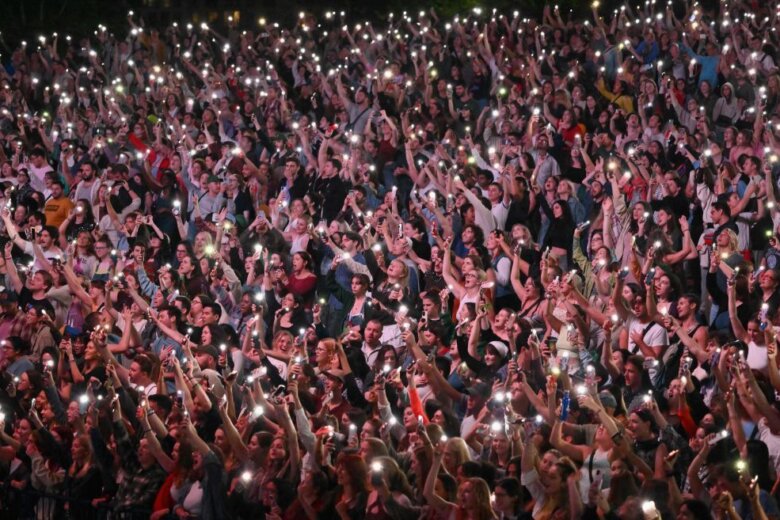
The All Things Go music festival, hosted at the Merriweather Post Pavilion in Columbia, Maryland, has only grown since its inception in 2014. Now, it’s bursting out of its 40-acre cage and seems like a whole different animal for potential festivalgoers.
This year’s festival sold out altogether shortly after tickets went on sale in April, with thousands still hoping to score reasonably priced (and legitimate) tickets through the festival’s waitlist. Since then, fans have swarmed to social media to voice how difficult it was to get tickets for the Sept. 28-29 weekend event.
From Skylawn to Swimming Pool: Behind-the-scenes tour of renovations at Merriweather Post Pavilion
As the show has grown from a one-day event in a lot at D.C.’s Union Market, festival founders made the decision to turn it into a two-day event in 2023 with überpopular, mostly female headliners, including Lana Del Rey, boygenius, MUNA, Maryland’s own Maggie Rogers, and many more.
This year’s lineup was announced April 16 and presale tickets went live the following morning. Hardcore fans of the festival were given priority before the lineup was even announced under the “Boomfy’s BFFs” presale, which many have said was difficult to locate.
The lineup includes indie charts heavy-hitters such as Hozier, Reneé Rapp, Remi Wolf, Julien Baker, and a slew of up-and-coming artists like Chappell Roan, Laufey and Lola Young.
But many fans were unable to get tickets to see this coveted lineup and were quick to criticize the festival for using Ticketmaster for the sale and for distributing presale codes to anyone that signed up with an email. Fans were also upset that tickets quickly went out of stock the day before the general public sale.
View this post on Instagram
‘It was just such a mess’
For prospective festivalgoers like Tara Moriello, a student at American University Washington College of Law, the waitlist could be the only option for attending.
She and her friends had been anticipating a great lineup for this year’s festival; she had even started a group chat with her friends called “Boomfy’s Groupies” — named after the festival’s cloud-man mascot.
But Moriello, 24, said by the time she sat down at her computer on the morning of April 17, there were already 8,500 people in the Ticketmaster queue ahead of her.
“Immediately I remember thinking, ‘Oh wow, 8,500 of us have presale codes, that kind of seems like a lot of people,'” she told WTOP.
“Not even 10 minutes after presale started, I see a little pop-up window come up on the Ticketmaster website that says something along the lines of, ‘Due to high demand for tickets today, sales will likely be limited,'” she said.
Moriello recalled thinking that was a bad sign.
At that point, there were around 4,000 people ahead of her in the queue.
“You mean nine minutes into presale I’m getting a message that tickets might be sold out before general sale? That made me a little nervous,” she said.
When she finally got through the queue and into the seat selection process, she recalled the general admission lawn section showing up gray instead of blue, meaning seats were unavailable.
“I click on it, I select four tickets. I try to add them to my cart and it says, ‘These tickets are no longer available,'” Moriello said. “I kind of accepted defeat and logged out of Ticketmaster.”
Like many others, she immediately went to social media to vent and see if others had a similar experience.
“There’s posts within one or two minutes of each other. So many people were saying that they weren’t even able to select tickets. It was just such a mess,” she said.
It reminded her of the conversations and the commotion that came about during ticket sales for Taylor Swift’s ‘Eras Tour’ concerts, she said.
“It was really frustrating, honestly, to have gotten a presale code and not be able to get tickets,” Moriello.
She said regardless of how excited she was to attend the festival, she doesn’t feel optimistic that she’ll be able to find alternative options that are legitimate in order to go.
“I can’t afford to drop $800 on a music festival pass. I just can’t. For a general admission ticket, that’s just crazy. On principle, even if I could lose $800 on a music festival, I wouldn’t do it,” she added.
Moriello suggested the festival stop using Ticketmaster going forward, citing issues with resellers and bots beating out real fans, and bring back artist-specific presale codes for more die-hard fans.
“With a festival that’s increasingly and exponentially growing in popularity and size every year like All Things Go, I think it’s time for festivals like this to turn away from Ticketmaster and look into alternative vendors,” she said. “I just don’t think it was well-organized. And it seems to me the people who run the festival, the people who are in charge of ticket sales, didn’t quite take into account that this festival is blowing up in popularity and size. And they need to keep up with that as it takes on a larger scale.”
In regard to the new state legislation penalizing resellers that scam real fans out of tickets, Moriello said, in the meantime before the law goes into effect, executives and festival staff should be doing more to protect attendees and put up safeguards that prohibit resellers from being able to get tickets first.
“I’m not sure this experience has really changed how I will approach … getting tickets to festivals, but I think it has certainly helped me lower my expectations,” she said. “Because I think as long as big festivals like All Things Go use Ticketmaster for ticket sales, a lot of people will try to get tickets and be disappointed when they sell out quick.”
“For as negative as this experience was, trying to get tickets, it hasn’t necessarily discouraged me from the festival entirely. I still really like the festival, I like what it stands for. I really enjoy being a part of its ‘target audience,’ if you will. I just wish that it was easier for festivals to kind of move away from the Ticketmaster monopoly,” she said.
‘It’s inevitable’
“When there is a lineup that is this strong, it’s inevitable that not everybody who wants to come and see will fit in the venue. And it’s hard when you’re a fan and you really want to be on the inside. But we’re glad that All Things Go has gotten such a strong reaction from fans,” said I.M.P. Concerts communications director Audrey Fix Schaefer.
Bethesda-based I.M.P. Concerts has run the operations of Merriweather Post Pavilion for the past 20 years alongside other D.C.-area entertainment venues.
A majority of the comments under the post announcing the 10th anniversary show was sold out claimed bots beat out real fans when it came to getting tickets to the coveted show. It marks the third time the show has sold out entirely with tens of thousands of fans attending.
Schaefer points the blame on state and federal governments who she claims are failing to protect ticket holders from bots, though they are illegal. She said this will be changing in the near future, however.
“One thing I’m glad to report is Maryland (has become) the first state in the nation to make it illegal to sell a ‘speculative ticket,’ meaning that a ticket that you don’t have, which are all over ticket platforms such as StubHub and Vivid Seats, tricks consumers into thinking that they really have the ticket,” she told WTOP.
Last Thursday, Maryland Gov. Wes Moore signed legislation into law that would help make clear how tickets on resale sites are actually sold, and what the seller of the company has to disclose about the tickets. The bill makes it illegal for resale sites to charge secret extra fees and bans the sale of those speculative tickets. The law doesn’t go into effect until July.
“It’s now going to be illegal in Maryland. And the fines are going to be really steep, $10,000 for the first violation and $25,000 for subsequent ones. And it’s the ticket platforms … that are going to be financially responsible for it. So hopefully, that’s gotten their attention, and they’re going to clean it up,” Schaefer added.
WTOP has reached out to Ticketmaster for comment and have not yet received a response.
After doing a “thorough scrub” of the tickets already purchased for resellers and bots, Schaefer said more tickets will become available to those on the waitlist.
Get breaking news and daily headlines delivered to your email inbox by signing up here.
© 2024 WTOP. All Rights Reserved. This website is not intended for users located within the European Economic Area.








